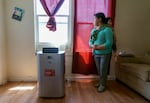Exactly one year after a deadly heat wave, the Portland Clean Energy Fund’s Heat Response Program has begun to deliver cooling units to homes in need. The program was created after nearly 100 people died of heat-related illnesses last June — many of whom were found dead and alone in their homes without air-conditioning.
Portland Clean Energy Fund was created by a voter-approved ballot measure in 2018 and has been celebrated as a first-of-its-kind environmental justice program led by communities of color. It’s managed by the City of Portland.
Part of the fund’s Heat Response Program allows local organizations that serve low-income or Black, Indigenous or communities of color to apply to be distributors and installers of portable electric heat pumps or cooling units in homes.
On Monday, environmental nonprofit Verde, one of the seven community partners participating in the program, installed five cooling units in an apartment complex in the Cully neighborhood.

Juana Pascual Pascual, holds her child Frankie Gaspar, 2, at their second-floor Portland apartment where they have lived for six years. She said her family suffered during last year’s heat dome, with just bottled water to find relief. On Monday, June 27, 2022, she received a free cooling/heating unit through the Portland Clean Energy Fund working with Verde.
Kristyna Wentz-Graff / OPB
Temperatures were in the 90s for the third day in a row, and the city was under a smog advisory because of the heat when Juana Pascual Pascual, 39, received one of those units. She’s been living in her two-bedroom apartment for more than six years with her three children — ages 14, 13, and 2. She said last year was unbearable.
“We suffered from the heat,” she said through an interpreter who spoke her Mayan Indigenous language of Akateko.
Pascual Pascual said during a walk she found an abandoned AC unit that she managed to bring home, but it only worked briefly.
“So, I put it away and we drank a lot of water,” she said.
At night, she said, her children struggled to sleep despite leaving all the doors and windows open, but now she’s thankful she doesn’t have to worry about the heat anymore.
“This will help me so much, we aren’t going to suffer from the heat like last year,” she said. “We’re not going to worry about the [heat] … We’re going to be happy with the kids inside.”
Pascual Pascual said the other rooms do not have any cooling units, so her family will likely sleep in the living room where the unit was installed.
She said learned about the program and how to apply through Verde’s social media accounts, and that at some point she will apply for financial help to pay her electric bills.
Verde Builds Program Manager Ricardo Moreno oversees the distribution and installation of cooling units for the organization and said so far they have received more than 700 applications.
“At this rate, we’re getting so many that we’ll have more people than we can deliver units for pretty soon,” he said. “Now it’s our task to go through the list and try to find the people who really need them the most.”
Moreno said the organization is prioritizing households with members with medical conditions that increase their risk of heat-related illnesses, homes where members are 60 years or older and households that do not have the means to purchase their own cooling units. He said the organization’s goal is to install 690 units in its first year.

A cooling/heating unit installed in an apartment on June 27, 2022, provided by the Portland Clean Energy Fund working with Verde. The units at Verde are available to people over 60, with a medical condition that can be affected by heat, and/or live alone.
Kristyna Wentz-Graff / OPB
“We started last week, and we have done 20 units and we’re picking up another 20 right now that we’ll be delivering in the next few days,” he said.
Magan Reed is a spokesperson with the City of Portland Bureau of Planning and Sustainability, which oversees the Portland Clean Energy Fund. She said the climate action group’s goal is to install 3,000 units by the end of this summer.
“From authorization to initial installation, this program was put together in about six months, which is incredibly fast, especially given constraints and challenges associated with the ongoing pandemic,” she said in an emailed response. “We are proud of how quickly we have implemented and begun execution of this program to help vulnerable Portlanders through future heat-related crises.”
The Portland Clean Energy Fund’s Heat Response Program made news earlier this year when Portland City Council voted to withdraw a nearly $12 million grant from its first recipient, Diversify Energy. The organization would have been in charge of purchasing all the cooling units, distributing them to the organizations selected and tracking how many units have been installed.
The withdrawal came after The Oregonian reported that the organization’s executive director, Linda Woodley, has previously served time in prison for defrauding energy companies and amassed millions of dollars in liens for unpaid federal and state taxes.
Earth Advantage was then selected to administer the program and offered a $10 million grant to install 15,000 units over a five-year period.
Two months later, Woodley then filed a lawsuit against the city for damaging her reputation and mishandling the process of withdrawing the grant. At that time, the Portland Clean Energy Fund also received its first city audit where auditors said the program is missing key elements, including climate change goals and oversight and accountability systems.
OPB’s Kristyna Wentz-Graff contributed to this story.


